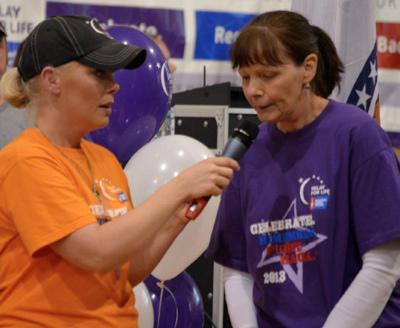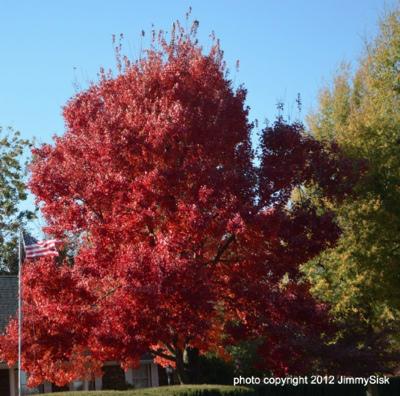
Dee Loflin, SMT Manager/Editor
A number of factors have contributed to the decline of the monarch population in recent years. Unusually hot weather in the spring of 2012, unusually cold weather last spring, and the loss of habitat throughout the Great Plains have combined to create hardships for the insects. Higher grain prices in recent years have resulted in more land being cultivated for crops and more weed-free farming techniques have reduced the number of milkweed plants in most agricultural fields. Several milkweed species are still common in Missouri, but in highly agricultural areas the plants can be too scarce to support migrating monarchs.
Monarchs lay their eggs on milkweed plants, of which Missouri has 17 native species. Caterpillars emerge from the eggs and feed on the leaves and stems. After feeding and growing for about two weeks, the caterpillar forms a chrysalis and pupates (transforms from caterpillar to adult butterfly). The adult butterfly emerges from the chrysalis after about 10 days. Adults live from 2 to 6 weeks and die after mating and laying eggs. The entire life cycle of the first three generations lasts 6 to 8 weeks each and four generations occur each year. The adult butterflies of the fourth generation migrate to Mexico and live until they lay eggs on their way back north the following spring. So the monarchs that you see moving south in the fall are four generations removed from the ones that headed north in the spring.
Planting milkweeds, especially in areas where they are currently scarce, can help monarchs be more successful in rearing new generations. Milkweeds are appropriate for use in home landscape plantings and several species are popularly used, especially by gardeners who enjoy helping monarch butterflies. Several milkweed varieties grow well in Missouri and range from 2 to 6 feet tall in a variety of colors. These include marsh milkweed, purple milkweed, common milkweed, and butterfly weed.
Nurseries that sell native plants often sell seeds and potted plants of those species. For a list of suppliers, see the Resource Guide on the Missouri Prairie Foundation’s Grow Native website at this link: grownative.org/resource-guide/. For a free brochure on the topic of butterfly gardening, email Pubstaff@mdc.mo.gov, or mail your request to Publications, Missouri Department of Conservation, PO Box 180, Jefferson City, MO 65102-0180.
For a high-resolution photo to accompany this story, visit mdc.mo.gov/node/27655.

Submitted by
Dee Loflin, SMT Manager/Editor
Dexter, Missouri - The American Cancer Society Relay For Life of Stoddard County, set to begin at 4:00 pm, May 2nd through 2:00 am, May 3rd at West City Park in Dexter, is a celebration of cancer survivorship and a fun way to raise the vital funds needed to help find a cure for cancer. The event will celebrate the lives of so many local residents who have survived cancer, while offering the hope of finding a cure.
“The Opening Ceremony will begin at 6:00 pm with a survivors’ lap where cancer survivors and their caregivers will take a victory lap around the track. The involvement of local cancer survivors is proof of the progress that has been made in improving cancer survival rates and the quality of life following cancer treatment,” said Shanna Gilberto, Community Manager, for the American Cancer Society. A candlelight ceremony also takes place to honor cancer survivors and remember those who lost the fight against this disease. The candle lighting will begin Friday night at approximately 10:00 pm, luminaria bags for the ceremony can be purchased at the event.
Relay For Life is an overnight community event bringing together teams of families, friends, churches, neighborhoods, and businesses – all with the same goal of conquering cancer. Teams of walkers keep a continuous presence on the track throughout the night, walking in shifts to raise funds for the American Cancer Society.
A full agenda of entertainment is planned, including music, team fundraising activities, fun theme laps and contests all night long. Relay For Life is a handicapped-accessible event.
Funds raised during Relay For Life help support the American Cancer Society’s mission of eliminating cancer by helping people stay well, by helping people get well, by finding cures, and by fighting back.
Helping you stay well. Finding cancer early can mean the difference between life and death. The Society helps you take steps to prevent cancer or detect it at its earliest and provide the most up-to-date information about how to reduce your cancer risk by healthy lifestyle choices. Contact 1-800-227-22345 or cancer.org for more information.
Helping you get well. Having cancer is hard. Finding help shouldn’t be. The Society is in your corner, around the clock to guide you through your cancer experience. The Society can help patients and their families make informed decisions about care, find moral support from others who have been there and offer practical solutions to daily challenges.
Finding cures. The Society funds and conducts groundbreaking research that helps scientists understand cancer’s causes, determine how best to prevent it, and discover new ways to cure it. The Society is the largest private funder of cancer research.
Fighting Back. Cancer is not just a health issue, but a political issue. The Society advocates for people to have access to critical cancer screenings and follow-up treatment – regardless of income. Some examples include: increasing government funding for cancer research, establishing smoke-free policies, and improving access to affordable, quality healthcare.
Relay For Life of Stoddard County would also like to invite all survivors to join us as we celebrate life at our annual Cancer Survivor’s Dinner. The dinner honoring local survivors will be held on Tuesday, April 29th at 6:00 pm, at the Lighthouse Church in Dexter, MO. Survivors and a guest are invited to join us for dinner, entertainment, and door prizes. Please RSVP to Nikki Finch, by calling 573-614-1401.

Submitted by
Dee Loflin, SMT Manager/Editor
Dexter, Missouri - A special luminaria ceremony during the American Cancer Society Relay For Life of Stoddard County remembers those lost to cancer and honors those who have battled and won. The luminaria candle lighting to represent these individuals is on Friday, May 2nd at 10:00 p.m. at Dexter West City Park.
Anyone desiring to purchase a luminaria may do so by contacting Courtney White at 417-861-6500. Each luminaria candle is $5.00 and can be In Memory Of or In Honor Of a loved one.
“It will be beautiful when all the bags with candles are illuminated around the track,” said Jennifer Hartlein, Event Co-chair. “We hope to sell enough to light the entire walking track.”
Relay For Life is a fun-filled, overnight event. Teams of eight to 15 members gather with tents and sleeping bags to participate in the largest fundraising walk in the nation. Relay For Life unites friends, families, businesses, hospitals, schools and churches ... people from all walks of life. Teams seek donations prior to the Relay, all with the goal of supporting a cure for cancer.
Relay For Life officially begins at 4:00 pm on May 2nd. Stoddard County cancer survivors will kick off the Opening Ceremonies at 6:30p.m. with the official survivors’ lap; then the rest of the participants will join the fun. Information about purchasing a luminaria, forming a team or walking in the survivors’ lap is available by calling 573-334-9352. For information on cancer, call the American Cancer Society’s 24-hour help line at 1-800-227-2345 or visit cancer.org.
The American Cancer Society combines an unyielding passion with nearly a century of experience to save lives and end suffering from cancer. We save lives by helping people stay well by preventing cancer or detecting it early; helping people get well by being there for them during and after a cancer diagnosis; by finding cures through investment in groundbreaking discovery; and by fighting back by rallying lawmakers to pass laws to defeat cancer and by rallying communities worldwide to join the fight.

Written by
Dee Loflin, SMT Manager/Editor
Dexter, Missouri - The Spark of Hope Relay for Life Team will host their 5th Annual Community Fair and Spring Fest Pageant which will be held this Saturday, April 26th from 10 a.m. – 4 p.m. at the Stoddard County Fair Grounds in Dexter, Missouri.
Support local vendors and crafters and most of all; support the Stoddard County Relay for Life, which will be held on Friday, May 2nd from 4 p.m. – 1:30 a.m.
Each booth will be charged $20 and will be donated to the 2014 Stoddard County Relay for Life on behalf of the Spark of Hope team.
There will be a variety of vendors to show from. Several home-based businesses have already signed up. Younique, Papparazzi Jewelry, Scentsy, and Origami Owl to name a few.
They will also be hosting a 50’s style Pageant by Jill Miller Worley. Entrance fee is only $30. Just contact pbpageants@hotmail.com for more information.
If you love old cars and trucks there will be a Gary Don Dowdy Memorial Car, Truck, Tractor & Motorcycle Show hosted by the Kenady-Hanks American Legion Post 59 of Dexter. If you would like to enter the car show contact Eric Smith at 573-718-8756 or dextercarshow@gmail.com.
For more information contact Team Captain Jamie Mays at 573-421-4173 or dextercraftfair@yahoo.com. They all have a Facebook page. Just click HERE.

Dee Loflin, SMT Manager/Editor
National Arbor Day is recognized on the last Friday of April, which is April 25 for 2014. Each state determines its Arbor Day based on its unique climate and weather patterns. Missouri has been observing Arbor Day since 1886 when the General Assembly declared that the first Friday in April should be set aside for the appreciation and planting of trees.
This year’s Arbor Day in Missouri has been recognized through a proclamation by Governor Jeremiah “Jay” Nixon as April 4. According to the proclamation: forests cover approximately one-third of the state; provide outdoor recreation, wildlife habitat, natural beauty, and watersheds for stream and rivers; provide employment for 33,000 people who convert trees into essential products; contribute beauty and shade to urban, suburban, and rural areas while creating a more pleasant and healthful environment; and Missouri will continue to benefit from its forests for succeeding generations through tree planting and conservation.
In celebration of Arbor Days and in cooperation with the Missouri Department of Transportation’s (MoDOT) “Trees for Tomorrow” program, MDC distributes nearly 100,000 native tree seedlings from its George O. White State Nursery to fourth-grade classes from more than 1,300 schools throughout the state each spring.
MoDOT supports the production and distribution of the trees to offset the natural resources it may disturb during construction activities. The seedling distribution supports MDC’s Discover Nature Schools program, which provides grade-appropriate curriculum and outdoor, hand-on activities to help students learn about the importance of conservation.
Get more information from MDC on backyard tree care, including proper tree selection and planting tips, online at mdc.mo.gov/node/3321.
TREES WORK
During Arbor Days and every day, MDC’s “Trees Work” public-awareness campaign reminds people how trees work for our wallets, health, families, communities, environment, and economy.
Trees Work for Our Wallets
Shade from two large trees on the west side of a house and one on the east side can save up to 30 percent of a typical residence's annual air conditioning costs.
Trees placed as windbreaks around buildings can save up to 25 percent on heating costs.
Street trees in neighborhoods increase sale prices of houses by an average of $8,870.
Trees Work for Our Health
Views of nature assist at the workplace. Employees with views of nature report 15 percent fewer illnesses and feel more enthusiastic and less frustrated than those without.
Those who commute along tree-lined roads remain calmer and drive less aggressively than those who drive along less treed roads.
Tree-lined streets are more walkable, encouraging more active lifestyles, which decreases obesity and improves heart health.
100-foot plantings of tall trees can reduce noise by 50 percent.
Trees Work for Our Families
Symptoms of Attention Deficit Disorder in children are relieved after spending time in treed areas. Kids can better concentrate, complete tasks, and follow directions after playing in natural settings. Contact with nature helps children develop imagination, creativity, and social relationships.
Trees along streets promote physical activity in children and increase longevity of the elderly.
One of the most effective means of protecting children from sun damage is to plant shade trees where they play.
Trees Work for Our Communities
A 10-percent increase in trees in a neighborhood reduces crime by 12 percent.
Trees improve downtowns. People are willing to spend 12 percent more for goods and services in downtowns with trees, and spend more time shopping and come back more frequently.
People tend to be more familiar and socialize more with neighbors in neighborhoods with trees.
Trees Work for Our Environment
Covering more than one-third of the state, Missouri trees and forests protect soil from erosion and filter water, provide oxygen needed to breathe, and clean the air by trapping and storing pollution.
Missouri forests and trees provide habitat for an incredible diversity of plants and animals that could not exist without them, along with a wealth of outdoor recreational opportunities and breathtaking scenic beauty.100 mature trees intercept about 100,000 gallons of rainfall per year, reducing runoff and providing cleaner water.
The net cooling effect of a young, healthy tree is equivalent to 10 room-size air conditioners operating 20 hours a day.
Missouri’s forests store more than 5 million tons of carbon. Each year, an acre of forest captures between one and four tons of additional carbon.
For each pound of new wood that grows, the tree removes about 1.8 pounds of carbon dioxide from the air and produces 1.3 pounds of oxygen.
Trees Work for Our Economy
Missouri trees and forests provide lumber and other wood products used around the state and around the world.
Missouri’s forest products industry contributes approximately $7.3 billion to the state economy annually, supports 41,200 jobs, and generates $610 million in taxes.
Trees along streets in Missouri communities provide $148 million annually in benefits, including energy savings, increases in property values, and storm-water retention.
For more information on how Trees Work, go online to mdc.mo.gov/node/19333.
WITHOUT TREES…
MDC’s Trees Work public-education campaign is holding a contest encouraging people to finish the phrase “Without Trees...” The winning slogan will be listed on the next poster in the Trees Work series. Simply email “Without Trees...” slogans to treeswork@mdc.mo.gov by April 30. The winner will also receive a complete set of the “Without Trees...” handcrafted letterpress posters plus 10 extra posters with their slogan to give to family and friends. For more information and to see current posters, visit mdc.mo.gov/node/19333.

